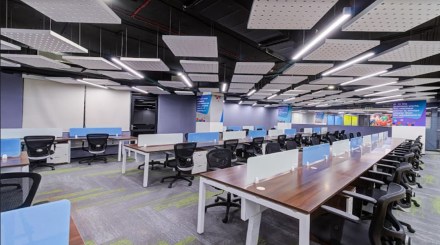India’s office sector is expected to maintain its strong growth momentum in 2025, which is likely to be driven by resilient economic fundamentals, a firm employment outlook, readily available talent pool, and favourable government policies, including relaxation of SEZ denotification norms, boosting occupiers’ confidence in expanding their real estate portfolios, according to a CBRE report.
The report titled ‘2025 India Market Outlook’ notes that the office sector has witnessed healthy supply growth over the past few years and is anticipated to maintain this momentum in 2025, underpinned by a robust pipeline of under-construction projects. Development completions would primarily be led by high-quality investment-grade assets, with ~60-65% of the new supply likely to be a part of integrated tech parks within top cities during the year. Developers are increasingly focusing on fully amenitised, green-certified assets in line with occupiers’ evolving preferences.
While established hubs such as Bengaluru, Hyderabad, Delhi-NCR, and Mumbai remain highly attractive, other key cities such as Chennai and Pune are poised to gain further traction due to the influx of strategically located quality supply, readily available talent pool, and occupier strategies focused on diversifying beyond gateway markets. This trend is also likely to stimulate leasing activity in tier-II cities.
Also Read: Should you buy a disputed property? Key risks and how to protect yourself
Commenting on the same, Anshuman Magazine, Chairman & CEO – India, South-East Asia, Middle East & Africa, CBRE, said, “The country’s office sector, having experienced record-breaking leasing performance in 2023 and 2024, is poised for sustained momentum in 2025. India’s abundant skilled talent pool continues to attract multinational corporations seeking to establish or expand their global capability centres (GCCs) and domestic enterprises looking to enhance their office footprint. With a strong pipeline of high-quality, investment-grade assets slated for completion during the year, the market is expected to witness an influx of fully amenitised, green-certified spaces that align with evolving occupier preferences,” he added.
Top trends expected to shape the Indian office sector in 2025:
Premiumisation on the agenda for developers and occupiers
Developers are adapting to the changing demands of contemporary businesses by focusing on cutting-edge facilities and extensive amenities. The growing number of large-scale buildings indicates a shift towards integrated or mixed-use developments, which aim to provide a comprehensive environment for both work and personal life.
Leasing surge set to persist for India Inc.
Domestic firms demonstrated a robust resurgence in office leasing during 2023-2024, with ~86% increase compared to the pre-pandemic period (2018-2019), fuelled by increased business confidence, expansion of businesses, and digitalisation. As per CBRE’s 2024 India Occupier Survey, 78% of domestic occupiers plan to expand their portfolios by 10% or more within the next two years. This strong appetite for quality office real estate is anticipated to continue as firms pursue growth through strategic expansion into new markets.
Multi-sectoral demand to add to market strength
India’s robust corporate expansion across diverse sectors is poised to further stimulate multi-sectoral office space leasing activity nationwide. The technology sector is expected to lead demand, with hiring anticipated to be concentrated in specialised domains such as artificial intelligence, machine learning, data analytics, cloud computing, among others.
GCC leasing expected to ramp up
Expansion into multi-functional centres, consolidation of existing GCCs, and the entry of newer firms are expected to contribute to the country’s GCC leasing activity. In 2025, CBRE anticipates GCCs to account for ~35-40% of the total office space absorption across top cities.
Commenting on the report, Ashish Agarwal, Co-founder, Enzyme Office Spaces, said, “As agility and cost efficiency continue to drive demand, India’s co-working sector anticipates transformative growth in 2025. Flexible workspaces, which witnessed a 30% surge in leasing activity following the pandemic, are no longer just an afterthought relic but the focus of corporate real estate patterns. Mid-tier cities like Coimbatore and Chandigarh are attracted by the dual factors of talent pool diversification and infrastructural spending, and so co-working operators are stepping outside the domestic technology firms, GCCs, and SME driven expansion. Sophisticated features without changing the spaces essence is the new trend. Most remarkably, mid-sized operators have begun to gain liquid capital quickly and expand assets because of the newly appeared SM REITs which is a welcome change.”
LC Mittal, Director, Motia Builders Group, said, “The Indian real estate market in 2025 stands out for its combination of innovation, investment, and patient capital. Institutional investment through foreign offices soared four times in 2024, bucking global trends, and is anticipated to attract considerable attention H1 2025. Domestic funds are on the lookout for value accreting assets and SM REITs focused on portfolios below INR 500 crore are facilitating exits for medium sized developers which is a first in India. Now that India has $2.5B+ unobstructed investment, targetting offices and industry and liberalized M&A and PE activity, India’s real estate sector has transformed from a niche market to a strategic cornerstone for global economies.”
Aman Gupta, Director, RPS Group, said, “There are two strong growth drivers in the Indian office space – India Inc and Global Capability Centres. Driven by digitalization and growth optimism, domestic mid size firms leased significantly by 86% in a year post pandemic and 78 saw further expansion plans. On the other hand, GCCs who have become strategic innovation centers for corporations overseas, are expected to contribute around thirty to forty percent of total absorption in the year 2025 due to the rich supply of AI, Cloud, and Analytics professionals. Besides, there is much growth in flexible space leasing due to the demand for agility from tenants. This, along with Technology, Banking, Finance, Services and Engineering and Entertainment, is indicative of India’s ability to be a diversified office market, which is growing while more tier II cities like Coimbatore and Ahmedabad come into the picture.”
